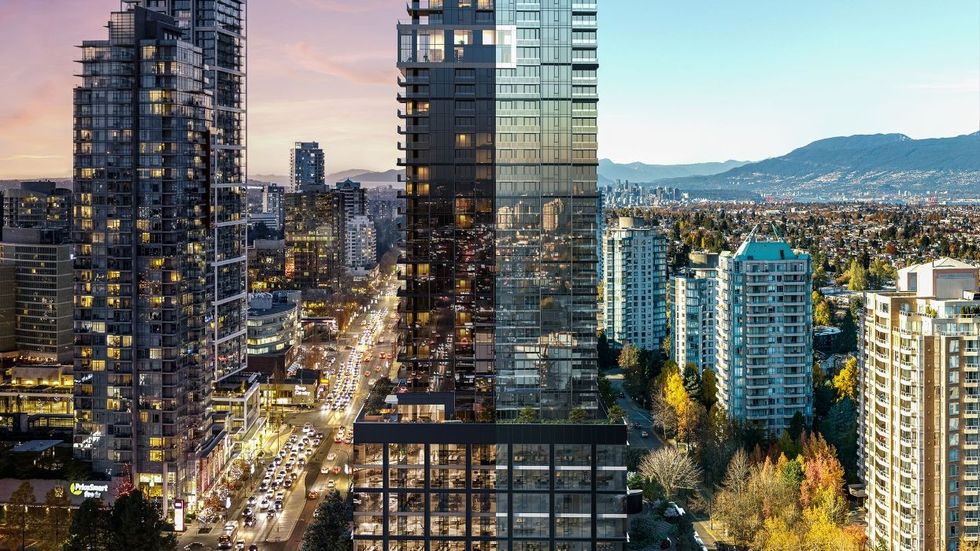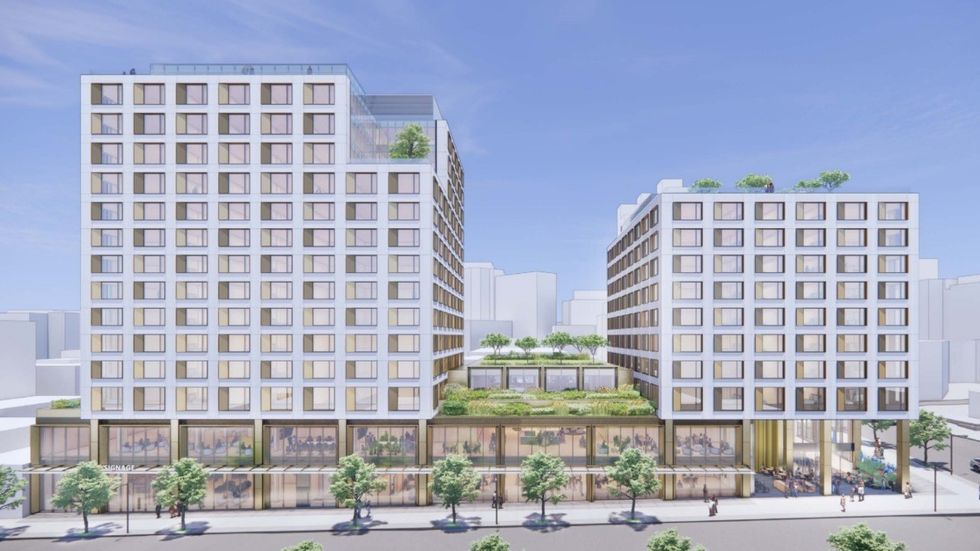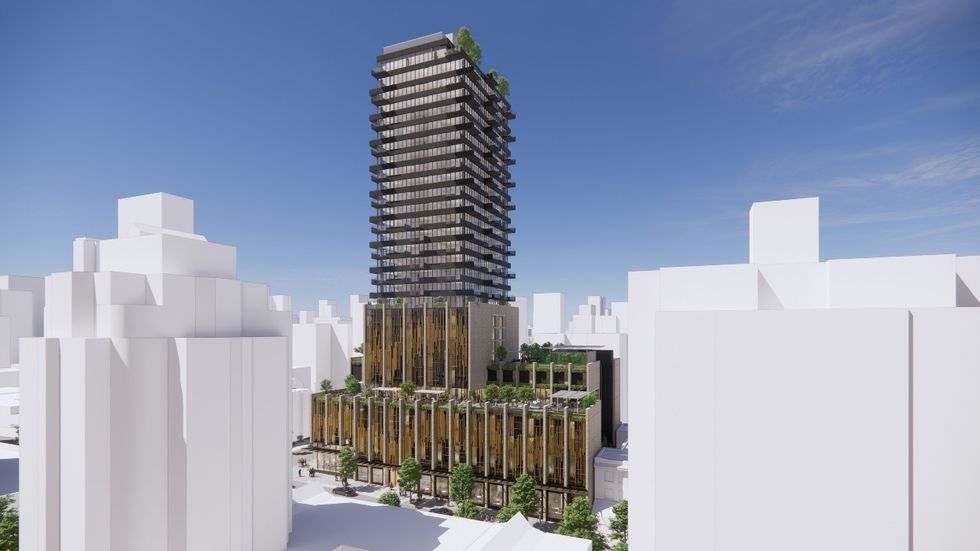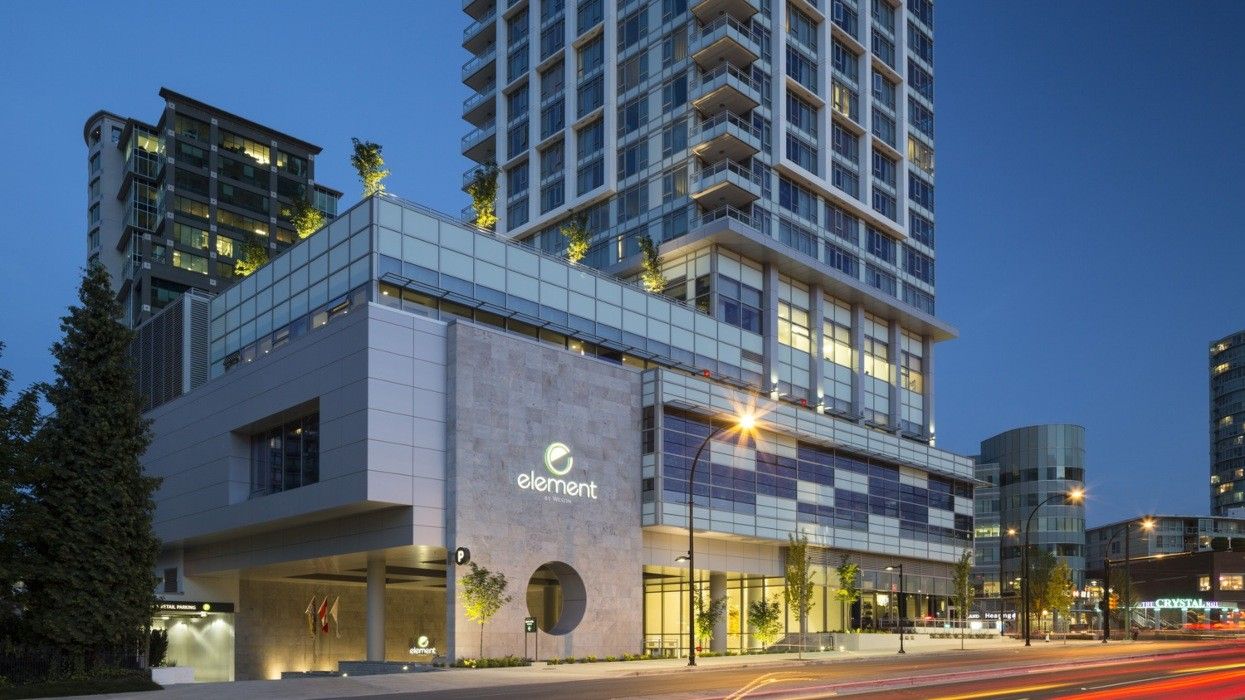According to a national office market report published by CBRE this week, new office construction in Canada has reached a low that we have not seen in quite some time.
"Having fallen for the last nine consecutive quarters, office construction has now lowered to 4.2 million sq. ft., a level not seen since 2004," said CBRE. "Well-below the 10-year average of 14.3 million sq. ft., activity is expected to remain muted until tenant demand for best-in-class space works through existing trophy/Class A space."
Zooming in on Metro Vancouver, CBRE says there is currently just 29,368 sq. ft of new office space under construction in downtown Vancouver as of the end of Q3 2024, none of which has been pre-leased.
These numbers do not inspire confidence, but likely also do not come as a surprise. Last year, as the wave of top-tier office buildings that were under construction since the pandemic all completed, one of the big questions about the office market was whether new office construction was going to fall off a cliff.
As the CBRE data shows, it very much has, and a year later we now have some answers about how developers are responding.
Pivoting To Hotels
While planned office projects that have not reached the construction stage have been shelved or scrapped altogether, many developers have mixed-use projects underway that received approval when they were planning to include office space as a significant component. Many are now pivoting to hotels.
In February, Thind Properties asked the City of Burnaby to allow them to convert 10 floors of their completed 48-storey Highline Metrotown tower from office use to hotel use. Similarly, and also in Burnaby, Anthem Properties received permission this summer for hotel use in the seven-level podium of their 66-storey Citizen tower, although Anthem is leaving the door open for office use. In Surrey, Lark Group also similarly received permission to convert 10 floors of their upcoming 23-storey City Centre 4 office tower into hotel use.

New hotel projects have also been proposed or are being explored.
Among others, Marcon is currently developing a 32-storey mixed-use hotel and Deecorp Properties is developing a 33-storey hotel, both in downtown Vancouver. A property that was previously being planned by Bonnis Properties as a high-rise strata office development has also been sold to an international hotelier. Over in the Broadway Corridor, Hallmark Hospital Group has proposed a new 12-storey hotel, while Bosa Properties has shifted an office-and-hotel project to full hotel, both of which are near Vancouver General Hospital.
It's not just that developers are choosing hotels, it's that they're specifically choosing hotels over office.
Office vs. Hotel
"Without a doubt, there are a growing number of proposals for hotel projects out there, throughout the city and particularly downtown," said Marc Ricou, Executive Vice President of Bosa Properties, in an interview with STOREYS in mid-September. "From the perspective of interest and potential pipeline of hotels, things are certainly as robust as I've ever seen them in my 30 years in the real estate business."
Aside from the aforementioned hotel project near VGH, Bosa Properties is also currently undertaking the redevelopment of the Listel Hotel on Robson Street in Vancouver. In Surrey, they have also modified their Parkway project to remove a previously-planned office component. In the past, Bosa Properties also developed the 45-storey Sovereign tower in Burnaby, which consists of 202 strata homes atop a Marriott-branded Element hotel.

Asked whether this trend of developers choosing hotels over office says more about the office market or more about the hotel market, Ricou said he thinks it's both, along with an increasing recognition that hotels are important to many other swaths of the economy, such as the conventions business and the film industry.
"There's definitely been a swing from office to... something else, and the only other thing is often hotel, when you're in a commercial district and you can't go to residential," he said. "The downtown in the office market has definitely been a driver in the hotel side."
"I've had some experience with looking at hotel projects eight to 10 years ago and back then, hotel was challenging because occupancy rates were a little bit low, room rates were quite low at the time, and it didn't drive a lot of value for developers," said Ricou. "And office was also relatively healthy back then, so if you're looking at a commercial site, office would have offered better returns than hotel. Fast forward to today, we have very strong conditions in the hotel business — very strong room rates, very strong occupancy rates — driven to a large degree by high demand — we've got the business sector coming back from COVID, we've got the cruise ship business — and a shortage of supply."
Developing Hotels
This doesn't mean there aren't any barriers or challenges with hotel development, however, and developers should still be a little bit cautious with the asset class and not over-commit, said Ricou.
"The asset class in general is volatile, in terms of your income and your revenue," Ricou explained. "In an office or industrial building, you have long-term leases, so you have quite a bit of stability in your income. Banks like stability. With hotels, you really have a lease term of one or two nights [with each guest], so if there's a downturn in economic conditions or a global pandemic, your income gets impacted immediately, and that leads to more uncertainty and more volatility in your income stream. Therefore, it makes it a little bit harder to determine what your returns are going to be when you're looking at a project and when you're obtaining financing from equity partners or banks."

Ricou estimates that today, a hotel room at a four-star hotel in Vancouver would cost — inclusive of land cost, hard costs, and soft costs — about $900,000 a room. All things being equal, Ricou says developing a hotel would be at the top of the cost scale, compared to an office or residential project. Part of what makes it difficulty, financially, is that you're not really getting as much bang for your buck, so to speak.
"Office benefits from quite a bit of efficiency," added Ricou. "When you build an office building, it tends to be that a high percentage of the gross area that you build ends up being rentable area. In a hotel, when you think about the back office, the reception area, the luggage rooms, the meeting rooms, and so forth, your percentage of area that you're actually renting out every night is a relatively small component of the overall area build."
Asked where he sees the interest in hotel going in the near-future, Ricou said he believes conditions will remain relatively firm so long as there continues to be a shortage of supply, and the shortage of supply is not expected to change because most, if not all, of the hotel projects in the pipeline won't be completed for several more years.
Last September, Vancouver City Councillor Sarah Kirby-Yung introduced a motion focused on addressing the hotel shortage in Vancouver ahead of big events the city will be hosting in the near-future — namely FIFA 2026. City staff were expected to return with policy recommendations in Q1 2024, but have yet to do so. Upon inquiry earlier this year, a member of the City's planning team told STOREYS that City staff have been conducting extensive research and engagement with the hotel sector and that policy recommendations are now expected to be presented to council sometime this fall.
- Court Allows Trump Hotel Vancouver Owner To Sue Ex-Bankruptcy Trustee ›
- New 30-Floor Hotel Proposed To Address Vancouver Hotel Shortage ›
- Chard Proposing 26-Storey Rental and 12-Storey Hotel in North Vancouver ›
- Marcon Cancels West End Condo Project, Pivots To 29-Storey Hotel ›
- Thind Properties Sells Highline Metrotown Hotel Component For $47.2M ›
- Reliance Properties Sells Downtown Vancouver Office Building For $24M ›
- Bosa Properties Buys 2.7-Acre Best Western Hotel In Burnaby ›
- Sunray Group Acquires Toronto's Bisha Hotel For $91M ›
- City Of Vancouver Introduces New Hotel Development Policy ›





















